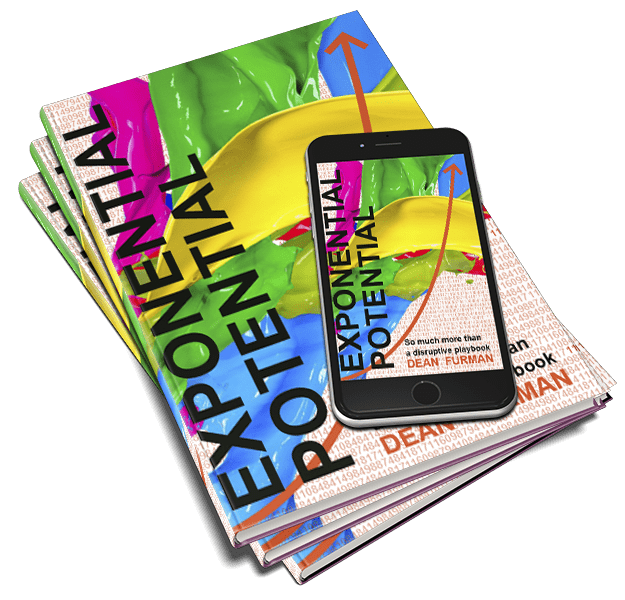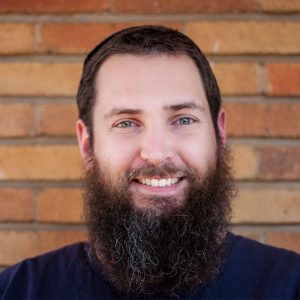
SME South Africa celebrates Game changers/Disruptors this March. Follow along as we explore ideas and people that are challenging the status quo.
You would expect a book called ‘Exponential Potential‘ to be all talk. Dean Furman’s new offering is fortunately, anything but.
Furman is a former actuary, turned entrepreneur, he is the founder and CEO of 1064, an innovation and growth advisory firm. He has founded new companies and created new businesses and products for large multi-national organizations, including heading up Alexander Forbes Group’s Innoruption Holdings, which focused on investigating and developing disruptive and ground-breaking new solutions. In 2016 he was voted one of the top South Africans under the age of 35 by the Mail & Guardian.
Furman’s book sells itself as “more than a disruption playbook”, and while it tackles big themes like innovation and disruption, it is refreshingly practical, offering tools for business owners to get the basics right if they are to ever reach their full disruptive potential.
It is super important to predict what the future will bring and react to it, but what many are ignoring is the amazing things that are possible today
Topics range from ways to develop the right mindset (with famous entrepreneurs like Airbnb’s Brian Chesky and Apple’s Steve Jobs, among others used as examples) and idea generation to explosive marketing tactics and how to scale your business.

SME South Africa speaks to Furman about how South African entrepreneurs should be thinking about innovation, and why Africa doesn’t need to be Silicon Valley.
Q: Why the title Exponential Potential for the book?
Rapid technological advancements will lead to many people losing their jobs and many large companies falling to their knees.
But, when writing the book, I wanted to focus on the flip side of these rapid technological developments. There are also more opportunities than ever before for those that are truly plugged into the “new world” to succeed.
I believe that readers of the book will be left with the mindset and toolset to thrive in this “new world” and to tap into the “Exponential Potential” that comes with it.
Q: What are you hoping to address in your book that others in the market do not?
There are lots of futurists around (probably too many to be honest – people attend one artificial intelligence conference and suddenly add the title “futurist” to their CV). Now that’s great, it is super important to predict what the future will bring and react to it but what many are ignoring is the amazing things that are possible today.
The world of innovation and technology has advanced at a rapid pace, but most people are understandably really busy and have not had time to keep up.
Now I wanted to be what I like to call a “Nowist” – the truth is that in a sense the future is already here and you don’t need to be a fancy shmancy company with a huge budget to take advantage of the amazing “new world”.
Small and medium businesses can now do things that they would never, ever have dreamt of doing a few years ago. Amazing enabling tools, can help them operate like a billion dollar organization at next-to no cost.
So, in this book. I wanted to provide a practical guide for growing a company in the new digital age.
I feel that many South Africans wrongfully have an inferiority complex, and don’t realise that you don’t need to be in San Francisco or Tel Aviv, to truly create something that can change the world
Q: What are the big challenges, with regards to innovation, do South African entrepreneurs, face and have to overcome?
I feel that many South Africans wrongfully have an inferiority complex, and don’t realise that you don’t need to be in San Francisco or Tel Aviv, to truly create something that can change the world.
The support system for entrepreneurs in South Africa is slowly getting better with more funding and mentorship becoming available to guide companies to get to the next level.
Much of South Africa’s best talent still sits inside large corporations. As the support structures for startups gets better this will slowly begin to change and these stars can then truly shine.
Q: What SA companies/founders/startups do you think embody SA’s innovative spirit, and that other entrepreneurs can look to as examples?
We have some amazing people and companies to choose from, but here are some of my top picks:
Adrian Gore, the CEO of Discovery is an amazing man. I started my career at Discovery and was super impressed by his relentless passion for finding new ways to help people enhance their daily well being. His drive is something that very few have and many should learn from.
Sally Williams, best known for their awesome nougat, is a great example of how a businesses outside of the technology space can soar to amazing heights when they have a quality product and a clear business plan.
Nandos is another company I admire. They are not afraid to be a bit bold and different. They have maintained their South African flair and have not become boring and safe over time, like most do.
Lastly but certainly not least, our very own president Cyril Ramaphosa is an entrepreneur himself and I hopeful that he will make changes that will spark more entrepreneurship in South Africa. He understands what is needed and I hope nothing gets in his way of making these positive changes.
Q: Your book is very good at breaking down complex ideas – what 5 ingredients (some of which are shared in your book) do you believe are needed to build a truly disruptive business?
Self-belief and passion– Disruption by definition, involves going against the norms. By challenging the status quo, there will be many naysayers. If you truly believe in your solution, ignore these naysayers. Times get tough as an entrepreneur – a passion or higher purpose behind what you aim to achieve will keep you going in the bad times.
Agility – You have to be ready to pivot along the way, when customers don’t react the way you had hoped, be agile enough to shift until you get a perfect product-market fit.
Humility – Don’t foolishly think that you know everything. Be a learn-it-all, rather than a know-it-all and learn as much as possible along the way. Learning is a powerful input, and do you know what the output is, [it is] “innovation”.
A modern day toolset – You are able to accomplish amazing things today using new technologies. You need to continually build your toolset so that you can use these tools to build something transformative.
Divine providence – Some people call this luck. I am a very religious man, I believe that G-d has an important role to play. Even if you have the world’s greatest team, strategy and know-how a number of other factors need to collide to truly become a massive world changing success. Some of the world’s smartest people are less well off than those that were far less capable. There is an extra force that dictates this. Anyone that has truly succeeded and does not admit that there was some “luck” or perfect timing at play is probably a liar.


